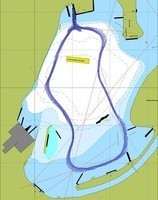
Green ship handling course
Courses program
For: Pilot/Captain/Officer
Prerequisites: No experience with scale models required. Solid experience as a navigator.
Duration: 5 days (43 hours) – Monday to Friday
Number of trainees per group: 2 to 4
Instructor: Experienced trainer, former maritime pilot and captain
Access request: Portrevel.com/contact
Access timeframe: Between 4 and 24 weeks depending on the course (time between request and course start)
Fees: Starting from €11,150 – Price does not include taxi/accommodation/restaurant, taxes, or additional training resources
Persons with disabilities: Please contact the center to explore possible accommodations
Trainee evaluation: Conducted continuously by the instructor throughout the course
Final evaluation and progress: Conducted at the end of the course, can be officially communicated to the client
Commitment and withdrawal from training: Procedure available upon request
General Objective:
To acquire and/or strengthen maneuvering skills through a better understanding of ship behavior in shallow waters, with a focus on eco-responsible maneuvering.
Learning Method:
Classroom theory is minimized to 1 hour per day to review key concepts. Trainees then spend 3.5 hours in the morning and 3.5 hours in the afternoon navigating on the lake.
Teaching Tools Available
In the classroom: Whiteboards, Nautical charts, Diagrams, Ship and propeller models
On the lake:Docks, Training ships, Portable Pilot Units (PPUs), Wave generators, Wind and current generators, VHF radios
Program:
Trainees first engage in the eco-design of their maneuver, focusing on a controlled and environmentally respectful execution. The environmental protection imperative forms the foundation of eco-design, requiring the reduction of port assistance, downplaying the importance of speed, and maximizing the use of natural controllable forces such as wind and current.
Port Revel has equipped two of its twelve ships with sensors to measure the total energy consumption during ship maneuvers.
Trainees are then tasked with performing the operation while aiming to stay below a predefined energy consumption target (and therefore emission level), set by instructors who have previously completed the same challenge.
Energy consumption is measured in kWh—the product of power (kW) and time (hours). This means the measurement is independent of ship speed:
"High power over a short time" yields a similar result to "low power over a longer time."
The total energy used for a given scenario will therefore depend on the pilot's ability to control the vessel’s space and optimize the use of environmental forces under control.

One of the tracks is shown here. It is 7 miles long and includes one undocking and one docking stern first.
It was sailed with the Otello in about 90 minutes at an average speed of nearly 5 knots (all values are full scale).
The total energy consumption measured was around 22 MWh, ranging from 18 MWh to 28 MWh ... showing significant variations depending on the pilot's way of manoeuvering.
The tests carried out with these models have shown that Port Revel masters the modelling techniques involved, and that similitude scales are maintained.
The program therefore enables the trainee to receive training in the design and execution of a safe maneuver, with a primary focus on environmental aspects and the control of production resources.
Detailed Program of Maneuver Principles
| Lundi | Brittany (190 000 DWT, on heavy ballast) Normandie (4 400 TEU over-panamax container ship) Berlin (38 000 DWT, loaded) Gilda (125 000 DWT, 70% loaded, with optional Becker rudder): - Manoeuvres involving turns onto transits, entering channels and dockings |
| Mardi | Europe (255 000 DWT, loaded) and/or Otello (8 500 TEU container ship): Otello (8 500 TEU container ship) Berlin: Gilda with Becker rudder: Ben Franklin (125 000 m3 LNG Carrier with Schilling rudder): |
| Mercredi | Brittany and/or Q-Max (266 000 m3 twin screw LNG carrier) : Europe: Gilda and/or Normandie or Ben Franklin or Otello: |
| Jeudi | Grenoble (43 000 DWT, loaded) and Berlin or Ben Franklin: Optional: Voyager with pods (1000 ft cruise ship with two pods): Q-Max and/or Otello: Brittany and/or Otello: Europe: |
| Vendredi | Europe: Gilda or Normandie or Ben Franklin: Berlin and Grenoble: |
